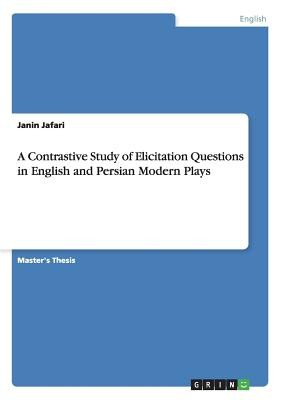
- We will send in 10–14 business days.
- Author: Janin Jafari
- Publisher: GRIN Verlag
- ISBN-10: 3656504156
- ISBN-13: 9783656504153
- Format: 14.8 x 21 x 0.8 cm, softcover
- Language: English
- SAVE -10% with code: EXTRA
A Contrastive Study of Elicitation Questions in English and Persian Modern Plays (e-book) (used book) | bookbook.eu
Reviews
Description
Master's Thesis from the year 2013 in the subject English Language and Literature Studies - Linguistics, grade: 19.80 out of 20, language: English, abstract: ABSTRACT A Contrastive Study of Elicitation Questions in English and Persian Modern Plays By Janin Jafari Questioning is one of the important skills in language learning. Moreover, understanding the discourse function of questions will help learners master the uses of questions. The purpose of the present study was to verify the applicability of Tsui's (1995) model of conversational analysis, specifically to the different subclasses of 'Elicitation questions' (i.e., inform, agree, commit, repeat and clarify) in English and Persian. This study also intended to contrast the subcategories of 'Elicitation questions' in English and Persian modern plays. To achieve the objectives, three modern English plays and three modern Persian plays were selected. In order to determine the frequency of each subcategory of 'Elicitation questions' of each language 361 instances from the English plays and 337 instances from the Persian plays were analyzed and compared. A Chi-square test was used to determine whether the difference was statistically significant. The results indicated that Tsui's characterization of the elicitation regardless of its syntactic form is feasible. Furthermore, Tsui's classification of 'Elicitation questions' into five subcategories in terms of discourse functions of the utterances is applicable. The findings also showed that first, both English and Persian texts used more Elicit: Inform and Elicit: Clarify; second, English and Persian texts used less Elicit: Commit and Elicit: Repeat respectively; third, Persian texts used Elicit: Agree twice more than those of English texts. The stated differences were shown to be statistically significant.
EXTRA 10 % discount with code: EXTRA
The promotion ends in 19d.00:46:55
The discount code is valid when purchasing from 10 €. Discounts do not stack.
- Author: Janin Jafari
- Publisher: GRIN Verlag
- ISBN-10: 3656504156
- ISBN-13: 9783656504153
- Format: 14.8 x 21 x 0.8 cm, softcover
- Language: English English
Master's Thesis from the year 2013 in the subject English Language and Literature Studies - Linguistics, grade: 19.80 out of 20, language: English, abstract: ABSTRACT A Contrastive Study of Elicitation Questions in English and Persian Modern Plays By Janin Jafari Questioning is one of the important skills in language learning. Moreover, understanding the discourse function of questions will help learners master the uses of questions. The purpose of the present study was to verify the applicability of Tsui's (1995) model of conversational analysis, specifically to the different subclasses of 'Elicitation questions' (i.e., inform, agree, commit, repeat and clarify) in English and Persian. This study also intended to contrast the subcategories of 'Elicitation questions' in English and Persian modern plays. To achieve the objectives, three modern English plays and three modern Persian plays were selected. In order to determine the frequency of each subcategory of 'Elicitation questions' of each language 361 instances from the English plays and 337 instances from the Persian plays were analyzed and compared. A Chi-square test was used to determine whether the difference was statistically significant. The results indicated that Tsui's characterization of the elicitation regardless of its syntactic form is feasible. Furthermore, Tsui's classification of 'Elicitation questions' into five subcategories in terms of discourse functions of the utterances is applicable. The findings also showed that first, both English and Persian texts used more Elicit: Inform and Elicit: Clarify; second, English and Persian texts used less Elicit: Commit and Elicit: Repeat respectively; third, Persian texts used Elicit: Agree twice more than those of English texts. The stated differences were shown to be statistically significant.


Reviews